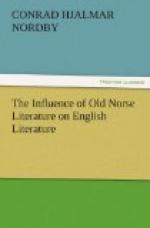In Lowell’s poems are to be found many figures and allusions pointing to his familiarity with Icelandic song and story. At the end of the third strophe of the “Commemoration Ode,” for instance, Truth is pictured as Brynhild,
plumed
and mailed,
With sweet, stern face unveiled.
In these borrowings of themes and allusions, Lowell is at one with most of the poets of the present day. It used to be the fashion, and is still, for tables of contents in volumes of verse to show titles like these: “Prometheus”; “Iliad VIII, 542-561”; “Alectryon.” Present-day volumes are becoming more and more besprinkled with titles like these: “Balder the Beautiful”; “The Death of Arnkel,” etc. In this fact alone is seen the turn of the tide. Heroes and heroines in dramas and novels are beginning to bear Old Norse names, even where the setting is not northern; witness Sidney Dobell’s Balder, where not even a single allusion is made to Icelandic matters.
MATTHEW ARNOLD (1822-1888).
Matthew Arnold’s strong sympathy with noble and virile literature of whatever age or nation led him in time to Old Norse, and his poem “Balder Dead” is of distinct importance among the works of the nineteenth century in English literature. It is an addition of permanent value to our poetry, because of its marked originality and its high ethical tone. “Mallet, and his version of the Edda, is all the poem is based upon,” says Arnold.[20] It is the poet’s divinely implanted instinct that gathers from the few chapters of an old book a knowledge wonderfully full and deep of the cosmogony and eschatology of the northern nations of Europe. “Balder Dead” tells the familiar story of the whitest of the gods, but it also contains the essence of Old Icelandic religion; indeed there is no single short work in our language which gives a tithe of the information about the North, its spirit, and its philosophy, which this poem of Matthew Arnold’s sets forth. In future days a text-book of original English poems will be in the hands of our boys and girls which will enable them to get, through the medium of their own language, the message and the spirit of foreign literature. Old Norse song will need no other representative than Matthew Arnold’s “Balder Dead.”
This is an original poem. It does not imitate the verse nor the word of the older song, but the flavor of it is here. Gray and his imitators drew from the Icelandic fountain “dreadful songs” and many poets since have heard no milder note. Matthew Arnold’s instincts were for peace and the arts of peace, and he found in Balder a type for the ennobling of our own century. Balder says to his brother who has come to lament that Lok’s machinations will keep the best beloved of the gods in Niflheim:
For I am long since weary
of your storm
Of carnage, and find, Hermod,
in your life
Something too much of war
and broils, which make
Life one perpetual fight,
a bath of blood.
Mine eyes are dizzy with the
arrowy hail;
Mine ears are stunn’d
with blows, and sick for calm.




